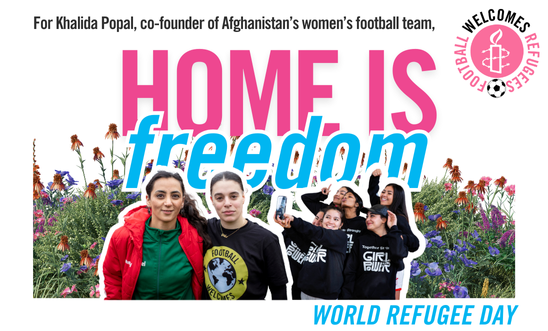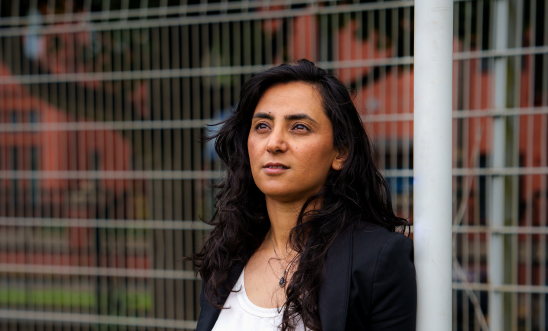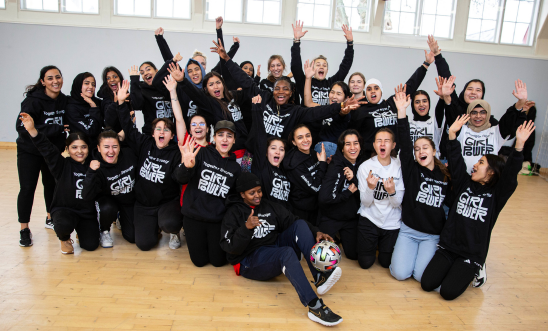
“From playing for fun to building a movement”: Khalida Popal on football as a platform for women’s rights in Afghanistan

“I was made to feel like a criminal by the Taliban & people supporting the Taliban’s ideology- for being a woman. In Europe, I was made to feel like a criminal- for becoming a refugee. But football is my home, wherever I am.”

Khalida Popal started a movement for women’s rights through football in Afghanistan. After the Taliban returned to Kabul in 2021, she helped evacuate 500 players and their families. In Europe, she knows that racist anti-immigrant rhetoric can be fought with the power of football to bring communities together.
“When you lose your home, the pitch becomes your home”
“Home means love, support, guidance”
How was growing up in your family home?
I grew up in a very open minded, supportive family back home in Afghanistan. Women and girls are seen as second class and in the majority of families the boys have more rights and are valued more than girls. But that wasn't the case in our family. It was a beautiful, supportive family, with very well educated people. I became who I am because of them.
Being the only daughter and the only girl in the family meant my parents and grandparents were trying to pay equal attention to me as they did to my brothers. They did this with love and support but also guidance to think about how we could use our privileges to support the community.
I came from a very privileged family, my mom was a Physical Education teacher, but not everybody's life was like that in a war-torn country like Afghanistan. When I was growing up, we still had a very strict culture preventing women and girls from education and basic fundamental human rights. The first time the Taliban took over, the country was still for eight years - people were prevented from education and development, not even allowed to watch TV. It affected our culture, with women and girls the hardest hit. The mindset was: “women belong to the kitchen, women belong to homes, women should serve and be deserving for men.” But we were girls that wanted to be on the pitch.
I grew up in a generation that wanted change. We wanted the right to equally participate in society, like my brothers had the right. And that was the challenge. We wanted to go school without being harassed and go to the shopping centre without being abused. The culture was not open to women and girls.
Building a movement through a magic ball
How did you start playing football?
Football came quite naturally into my life because my brothers were playing it. The boys in my neighbourhood were playing it and I was the only girl, so I ended up playing with them. But after a certain age, society notice, the neighbourhood noticed, and that was the challenge for me. I faced harassment, abuse and my brothers and the boys who were playing with me were pressured to keep me away. I couldn’t keep playing with them. I didn't have any girls to play with. So I went to find some.
Football was my passion. I said to myself “society shouldn't take that away from me. It's just because I'm a girl, I can’t let it happen. I won't give up.” I knew there must be another way: what if there were other girls like me who wanted to play but couldn’t?
I went to different schools and said “I love football, it gives me happiness. I feel empowered and I like the way it makes me feel. Will you join?” We started a movement in schools, one classroom at a time. I told them I would be at the pitch every morning at 6am, two hours before class started. When I say “pitch”, I mean a dusty, muddy, stony ground with rocks where we used two sandals as goal posts. In privileged countries, people have access to equipment - we didn’t.
Football is the game of moments and magic: on and off the pitch. A lot of our teammates played with sandals, so when they were shooting the ball, the sandal flew with it. We called our ball ‘the magic ball’, because the minute it starts rolling, everybody becomes happy. I wanted to play football no matter what, saying “nobody can stop me”. I was in a very safe bubble having a privileged, supportive family. But that changed. A group of men attacked our team and destroyed our ball with the knife. At that point we understood that our mission was much bigger than the pitch: we were going to create a sisterhood of women standing up for each other as a united voice for our silenced sisters.
We went from playing for fun to building a movement. Football naturally became a sort of activism for us, a platform to stand for our rights as women and girls of Afghanistan. We played for the first time in the national team of Afghanistan and made history. That is one of the proudest moments of my life: playing in an international tournament, the Afghan national anthem playing and us standing wearing our jerseys. We fought hard for that.
From the Taliban to a refugee detention centre
How did you flee Afghanistan?
Through the platform we were getting, we started speaking directly to the women and girls watching us on TV, encouraging them to stand up for our rights and say no child should be forced into marriage or face violence. That was dangerous for so many people, it was seen as a risk especially by men who were leading. My family was receiving death threats. I was receiving phone calls, warnings. I was forced to flee Afghanistan because my life was in danger. I was so lucky that I survived.
But life as a refugee is so different. In Afghanistan you face the Taliban as a woman who wants change in that extreme culture. But then you become a refugee in a Western culture, where most of the books on human rights get written: and here, you face a different challenge, now because of the colour of your skin and the status of being refugee. Most of the time, I am made to feel like a criminal.
The system treats you like you’re a criminal, you haven't done crime, but you have to prove yourself, that you’re innocent. That is the journey of a refugee. You explain yourself over and over, reliving the trauma. On top of that, you have to face the negative narratives around you and about you.
When I arrived in Denmark, the refugee detention centre was placed in a military campus. Imagine fleeing war and then not being allowed to leave a military campus, isolated and dealing with the trauma of fleeing. Across refugee camps, people usually sleep at five in the morning, to avoid the nightmares. And that was the moment I came back to my purpose: my purpose was to serve people, not a nation. Football is my home, wherever I am.
I already knew that when the ball gets rolling, it has its own language - no explanation is needed. So I took a small sound box and my ball, and started knocking on doors. We taught each other how to ride bikes, how to play football. And again the magic ball came back. That’s where the idea for Girl Power (pictured below) started, connecting football and education for women and girls, mainly minoritised communities and refugees. Through football, we can connect divided communities together. In the pitch, people can directly connect with us - not through the media or what the TV says about us, but as people, because we are people who were forced to flee. I fled from the Taliban to save my life, not to steal someone's job.

Return of the Taliban and evacuating 500 players
What happened when the Taliban returned?
2021 was a nightmare for so many. The government surrendered and escaped Afghanistan and foreign governments left Afghanistan. There was no protection for activists.
Our players and the women that found the Afghan women's national team were activists. We used the power of football to be the voice of those silenced and to address and challenge the ideology of Taliban including the way women and their roles were stereotyped. The Taliban were our enemies.
So when the Taliban returned to power in Afghanistan, the women who played and supported women’s football were exposed. Not only did the Taliban take our homes away from us but they were exposing the identity of activists. Women weren’t just frightened of the Taliban but some men in the area who were always opposed to our activism.
At this point I was living in Denmark and I received phone calls from my sisters and I felt powerless. I was so far away. I didn’t have economic or political power. How can I help women in Afghanistan?
I connected this moment back to the first time I raised my voice: knowing my voice was my power. I remembered the power I had when I started women’s football when I was young. I thought I didn’t have power then but I did. And I realised, I have power now.
I decided “I’m going to raise my voice to make changes”. I started doing interviews, I called the women in Afghanistan and advised them to delete their social media accounts, burn their photos of them playing football and burn their jerseys - the ones we sacrificed so much to buy.
At the same time, I was making calls to human rights lawyers, footballers and former athletes to ask them to support women trying to escape Afghanistan. They joined forces and helped us lobby governments and helped players and their family escape. The Women’s national football team were evacuated to Australia and women’s youth teams were put on coaches to Europe.
We helped over 500 people escape.
They are great activists and role models and are still active. It means I'm not alone in my advocacy. We are a group of strong young women of Afghanistan who are using their voices to be the voice for our sisters in Afghanistan.
Football Welcomes: making a home in the pitch
How have you made a home in the pitch in the UK?
Anti-refugee and anti-immigrant movements are growing in the UK and around Europe. They are pushing a lot of negative narratives and causing division.
But the British football family welcomed us women from Afghanistan. My sisters were connected back to home through coming together through football.
I remember the football game we had against the UK Women’s Parliament team which was organised by Amnesty UK through their Football Welcomes project. It was the first time that my sisters were back together with the passion to compete and as many of them were standing on the pitch, they felt at home.
I worked with incredible people like Sandy Abi-Elias who runs the Women Leadership programme in partnership with Amnesty UK and the Football Association (FA). This gave an opportunity for my sisters to learn new skills and grow in confidence. It’s helped them secure jobs and scholarships. Sandy was a role model for me and my sisters. They could see themselves in her.

“I wrote this book for my sisters”
You've written a book out today, what is it about?
My book isn’t just my life story but the story of my sisters’ resilience. It's a recipe for people who want to become activists and give back to communities.
I wanted to give a voice to our silenced sisters stuck in Afghanistan. I hope that anyone who reads this book will think about the women who are still in Afghanistan who lost their human rights, who are not allowed to study, play sports and banned from any social activities based on their gender.
But I also wanted to tell the story of my sisters from the Afghan women's national team, their dedication and sacrifices. I'm sure it will inspire so many people.
Our blogs are written by Amnesty International staff, volunteers and other interested individuals, to encourage debate around human rights issues. They do not necessarily represent the views of Amnesty International.

0 comments